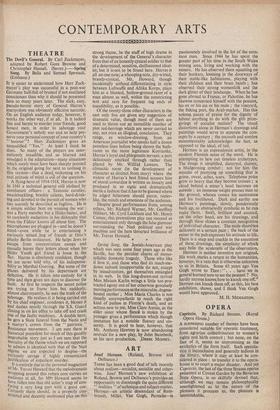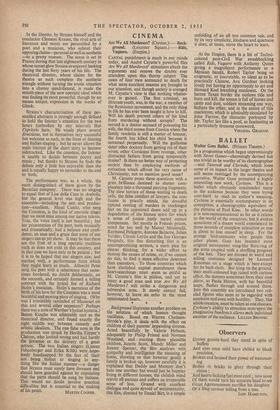OPERA
A SURPRISING number of themes have been considered suitable for operatic treatment, from agrarian collectivisation to women's rights and birth control ; but none, on the face of it, seems so unpromising as the aesthetics of the form itself. Such specula- tion is inconclusive and generally tedious in the library, where it may at least be con- sidered in place : to transfer it to the opera- house is to court a major disaster. And yet Capriccio, the last of the three Strauss ,operas presented at Covent Garden by the Bavarian State Opera, is so skilfully •devised that, although we may , remain philosophically unenlightened as to the nature of the pleasure it procures us, the pleasure is unmistakable. In the libretto, by Strauss himself and the conductor Clemens Krauss, the rival arts of literature and music are personified by a poet and a musician, who submit their opposing claims—personal as well as aesthetic —to a pretty woman. The scene is set in France during that late eighteenth century in whose sunset glow Strauss so enjoyed basking during the last forty years of his life. The theatrical director, whose claims for the theatre as such complete the aesthetic triangle without turning the erotic situation into a clumsy quadrilateral, is made the mouth-piece of the new operatic ideal which was finding its most powerful, though by no means unique, expression in the works of Gluck.
Strauss's characterisation of these per- sonified abstracts is strongly enough defined to hold the listener's attention for the two hours (unbroken by any interval) that Capriccio lasts. He wisely plans several diversions, not in themselves very successful but welcome as such, in the form of dancing and Italian singing ; but he never allows the main interest of the short story to become sidetracked. Like the countess, the listener is unable to decide between poetry and music ; but thanks to Strauss he finds the debate only a little less enjoyable than she and is equally happy to surrender in the end to both.
The performance was, as a whole, the most distinguished of these given by the Bavarian company. There was no singing to equal that of Lisa della Casa in Arabella, but the general level was high and the ensemble—including the sets and produc- tion—excellent. Maud Cunitz, who sang the Countess, is the kind of operatic singer that we most miss among our native talents. True, the voice itself is not beautiful ; but her presentation of the part, both musically and dramatically, had a balance and confi- dence, an ease and a grace that none of our singers can as yet show. It may be that these are the fruit of a long operatic tradition such. as does not exist in this country, and in that case we have only to be patient ; but it is to be hoped that our singers saw, and marked well, a performance from which they might learn so much. Albrecht Peter sang the poet with a vehemence that some- times bordered, no doubt deliberately, on the uncouth, and certainly formed a telling contrast with the lyrical fire of Richard Holm's musician. Holm's narration of the birth of his love for the Countess was a most beautiful and moving piece of singing. (Why was I irresistibly reminded of Massenet on this and several other occasions? Perhaps there was a note of Werther's lyrical hysteria.) Benno Kusche was admirably cast as the theatrical director, and found exactly the right middle way between comedy and artistic idealism. The one false note in the production was struck by Hertha T8pper's Clairon, who looked wrong and had hardly the presence or the delivery of a great actress. The two Italian singers (Lorenz Fehenberger and Erika Koth) were hope- lessly handicapped by the fact of their not being Italian or singing in any- thing like the Italian manner — a danger that Strauss must surely have foreseen and should have guarded against by stipulating that the parts should be sung by Italians. This would no doubt involve practical difficulties but is essential to the making



















































 Previous page
Previous page